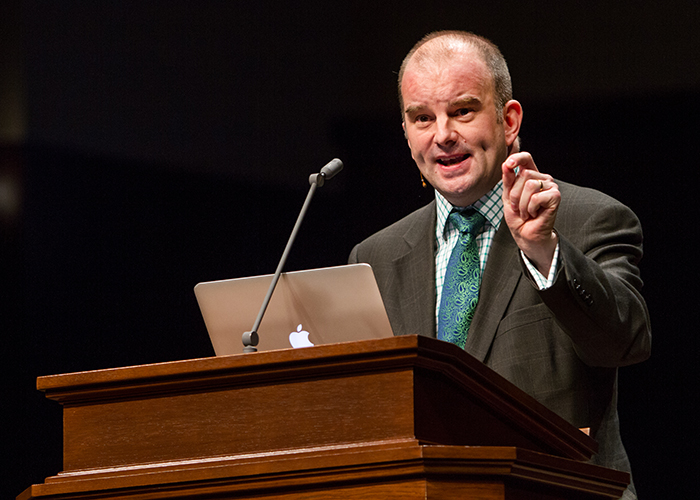Sexual revolution involves redefinition of human identity, lecturer says

According to Carl Trueman, speaker for Southwestern Seminary’s annual Day-Higginbotham lecture series, contemporary sexual politics are about more than just countering traditional mores. The sexual revolution of the 20th century grew out of something much more radical: a fundamental redefinition of what it means to be a human being.
Trueman, professor of church history at Westminster Theological Seminary in Glenside, Penn., probed deeply into the problem of western sexuality and sexual politics during the two-day lecture series, Feb. 11-12. His goal, Trueman explained, was for Christians to gain a clearer understanding of the culture in which they lived.
The LGBTQ movement today is not just challenging the boundaries of what is ethically right or wrong, Trueman argued, but is creating a new human identity predicated on sexuality. The wider culture, therefore, understands the Christian outcry against homosexual sex not as a moral argument but as an attack against the identities of real persons.
“You are saying that somebody’s identity is illegitimate,” Trueman said. “That is much more powerful and provocative than simply saying you don’t believe people should sleep together before marriage.”
This kind of identification with one’s own sexuality was not always a plausible way of thinking, however. Trueman finds the roots of the development in two traditions: 18th- and 19th-century Romanticism and the legacy of psychoanalysis started by Sigmund Freud.
Trueman said that the emphasis on emotions triggered “an inward turn” in Americans during the Romantic era. Individuals who previously constructed their identity through participation in public activities now sought fulfillment in satisfying their inner feelings. By the 20th century, the pursuit of psychological happiness had become a legitimate goal.
Freud gave this psychological development a sexual twist. “Freud identified happiness with sexual fulfillment,” Trueman explained. “Happiness is intimately connected to the sex drive and to personal sexual satisfaction.”
This emphasis on sexual happiness had direct and far-reaching repercussions on the definitions of sex and marriage in western society. Sex and marriage, previously understood in terms of social functions such as procreation and the expression of a unique lifelong unity between husband and wife, now became mere venues for personal satisfaction and pleasure. Recent developments on gay marriage, then, are just one aspect of the many results of a devastating breakdown in the traditional meaning of sex and marriage.
One of the major agents that helped propagate such ideas throughout society was technology. Not only did contraception and medicine allow people more sexual freedom, but visual media also showed people false realities wrapped up in tasteful aesthetics, which helped normalize what previously was not “normal.” Pornography, for example, turned the human body into a dehumanized commodity to be used for one’s own entertainment. Television programs had an even wider, if subtler, influence.
In a world that prioritizes such psycho-sexual happiness, Trueman proposed four courses of action for Christians. The first three concern studying the culture of the world in more depth.
“Protestantism needs more people studying ethics,” he noted. “Then, I think we need to understand the significance of the human body. Thirdly, I think we need to realize that the sexual identity war going on around us is a war of identity.”
The final answer lies with local churches. “We need churches that clearly teach counterculturally on the nature of human existence and foster communities to support and maintain that,” Trueman stressed. “[Make] real friendships with real people: real friendships with gay people, real friendships with transgender people—real relationships into which the Gospel can then speak.”



